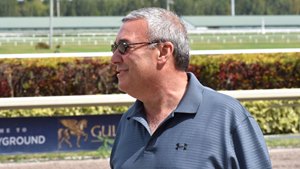Florida Horsemen Meeting to Address New Immigration Law


The Florida Thoroughbred Horsemen's Association will hold a meeting next week at Gulfstream Park to inform trainers and horsemen about the state's new immigration law.
The law, which goes into effect July 1, requires business owners with 25 or more employees to use the electronic E-Verify system to confirm the immigration status of new hires. It also means businesses are subject to fines and penalties for employing undocumented workers.
For example, sending an undocumented worker across state lines and into Florida could amount to a state felony. Trainers shipping horses will need to take note of that.
Horsemen are concerned about how the law could affect Florida's racetracks, training facilities, and farms.
"We're aware of the law, and we actually have an attorney coming to speak to the trainers at Gulfstream and Palm Meadows to make us aware of the law as it reads because nobody really understands it," said FTHA interim president Joe Orseno, who added the meeting at Gulfstream will occur late Wednesday morning.
Orseno said he has heard "rumors" that some Palm Meadows workers had left in fear that the law would affect them.
"The way I understand the reading of the bill is that the people who have been with me are grandfathered in and are part of the 25. If there's more than 25, then everybody who's new will have to obviously pass the loopholes and everything going on," Orseno said.
George Isaacs, general manager at Bridlewood Farm in Ocala, said his business already has been using E-Verify. However, he heard the new law has impacted other farms in the area.

"I have heard, via the grapevine, that a lot of people packed up and left overnight when they heard this news," Isaacs said. "And I've heard that from reliable sources, reliable farm owners and farm operators, that they've already seen a distinct exodus out of the state with some very good employees, some very good families that have been helping in this area on these farms for a long time. And it's just because they are scared."
Isaacs said he was unsure whether seasonal workers will be treated differently than full-time employees.
"There could be some (argument) that seasonal employees aren't really mandated under this new law because they're not full-time employees and they're not going to work at the business year-round," Isaacs said. "I think this could be a 'loophole' that people could explore."
Lonny Powell, CEO and executive vice president of the Florida Thoroughbred Breeders' and Owners' Association, said the new law could prove challenging for the horse racing industry.
"It's a real challenging path for both the industry and for those people that are either working for trainers or working at farms," Powell said. "Everybody in the horse industry is encouraged to educate themselves as much as possible and understand what your options are within the law."
